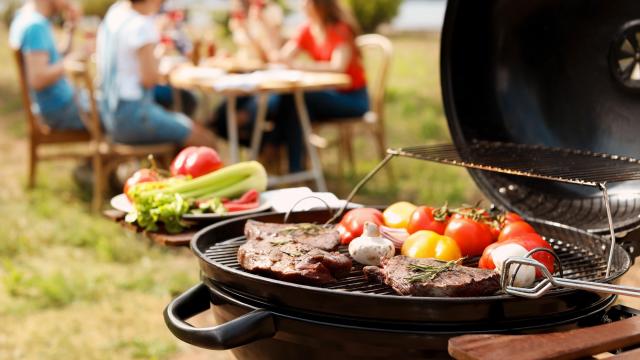Cookout season is finally upon us — but with all the fun of cooking and eating outdoors comes additional food safety concerns. You’ve probably eyed a creamy potato salad and intuitively known it’s probably not ideal for it to be sitting out in the sun all day — even though the truth about mayo may not be as scary as you think (more on that below). According to the CDC, food poisoning peaks in the summer months when warmer temperatures cause food borne germs to flourish. Here’s what to know to keep your barbecue or cookout safe this summer.
Leaving food out for too long
One of the top concerns for cookouts and barbecues is food sitting out in the open for hours at a time. As a rule, hot foods should be kept hot, and cold foods should be kept cold.
The CDC recommends refrigerating leftovers within two hours of cooking; the USDA recommends leaving food out for no more than an hour when the temperature outside is 90 degrees or hotter.
We advise playing it extra safe with cold dishes like dips and creamy salads by not leaving them out under the sun for longer than an hour. Bring a cooler and ice to pack away any food that needs to stay chilled, and think twice before eating that last hamburger patty hours after your guests have left.
The myth about mayo
One of the biggest myths about cookout safety is that any mayo-based dish is a danger zone, but the truth is, mayo is not the bacteria-breeding substrate most people think it is. In fact, Lifehacker senior food editor Claire Lower points out that, due to its acid content (by way of vinegar or lemon juice) store-bought mayo can actually prevent bacterial growth. Where you need to be more careful is if you’re using homemade mayo, due to the raw, unpasteurized eggs. This doesn’t mean you can leave mayo-based salads out in the sun indefinitely, however — those dishes often contain meat, eggs, cheese, and pasta, none of which should be consumed after that two-hour window.
Mishandling your meats
If you ask me, handling raw meat is the most intimidating aspect of cooking. If I’m not worried about ruining a perfectly good piece of meat, then I’m worried about giving my guests food poisoning.
The following grilling guidelines come from the CDC for handling raw meat, chicken, and seafood:
- Separate it from other food.
- Refrigerate it before grilling.
- Wash your hands before and after handling it.
- Be aware of juices spilling and splashing, and make sure you always clean up after.
Make sure you have a designated plate and cooking utensils solely devoted to raw meat. Never cross-contaminate your raw meat station with the finished product.
Use a food thermometer to ensure it is cooked to a safe temperature. Although the FDA advises chicken should be cooked to at least 73°C, you can safely cook chicken to 70°C, provided you hold it at the lower temperature for the appropriate amount of time (this article from Serious Eats has a handy chart to help you do so). According to the U.S. Department of Agriculture: Beef should be at least 60°C and ground beef should be at least 70°C. Pork roasts and chops should also be cooked to 60°C, although there’s a case to be made for pinker pork than you might be used to preparing.
Let’s talk dogs
Since this is a barbecue, we’ve got to talk hot dogs. There’s a pervasive myth that since hot dogs are “pre-cooked,” you don’t have to be as careful cooking them fully. This isn’t true. The FDA recommends you always reheat hot dogs until they’re steaming hot, around 60°C. Do not eat raw hot dogs. Is that really something you needed to hear? For so many reasons, do not eat raw hot dogs!
Additionally, if you’re pregnant, you might want to consider skipping hot dogs (and other deli meats) altogether.
Sharing food and sharing germs
Even though we’ve spent the past few years of the pandemic being told that outdoor events are typically more spread out and therefore safer, cookouts are still a hot spot for sharing germs buffet-style. Keep the following tips in mind to avoid the spread of germs:
- Make sure everyone at your gathering has a way to wash their hands often.
- Designate utensils for serving shared items.
- Avoid sharing plates and cups.
- Avoid grabbing items like chips and hot dog buns with your hands.
- If you’re feeling any sort of cold, flu, or COVID-like symptoms, just stay home.
Check out some more tips for hosting the perfect summer cookout.

Leave a Reply
You must be logged in to post a comment.